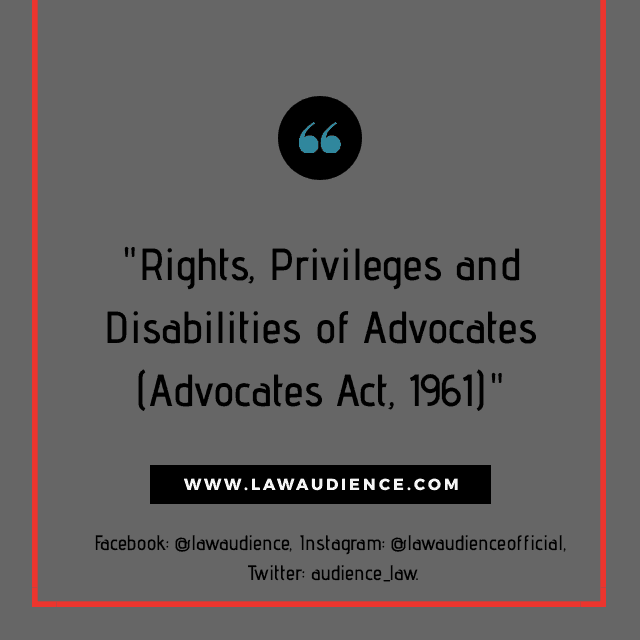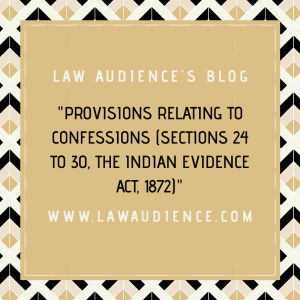AUTHORED BY: MS. NISHITA KAPOOR, B.COM.LL.B, STUDENT AT UNIVERSITY INSTITUTE OF LEGAL STUDIES, PANJAB UNIVERSITY & RESEARCH WRITER AT LAW AUDIENCE.
I. INTRODUCTION:
The preamble of the Advocates Act, 1961, specifies that this Act has been made with the objective of amending and consolidating the law relating to the legal practitioners[1]. This Act has replaced the Indian Bar Council Act, 1926. The All India Bar Committee was not satisfied with the Act of 1926 as the powers which were conferred on the Bar Councils were very limited and they were not made autonomous bodies. It was then, that the Advocates Act, 1961 was passed.
II. RIGHTS OF ADVOCATES UNDER THE ADVOCATES ACT, 1961:
a) RIGHT TO PRACTICE (SEC 30):
Under the Advocates Act 1961, Advocates have been recognized as the only one class of persons entitled to practice the profession of law[2]. According to Section 30 of the Act, this right to practice can be exercised in all the courts and tribunals throughout the territories to which this Act extends and also before any authority or any other person who is authorized to take evidence or before whom the advocate is entitled to practice under any law[3].
It was observed in the case of J. Sampath Kumar v. Bar Council of India[4], that right to practice as an advocate is merely a statutory right and not a fundamental right.
It was held in the case of Praveen Pandey v. The State of Madhya Pradesh[5], that if the Advocates have abstained from the judicial work, it negates the statutory right of the Advocates to practice and also is the violation of their freedom to practice any profession which is guaranteed under Article 19(1) (g) of the Constitution of India.
b) RIGHT OF PRE-AUDIENCE (SEC 23):
The right of Pre-Audience means the right to be heard before the other advocate is heard. It is his right to claim audience while he is representing his client in the court of law that is the court will have to listen to him so long as he does not disturb the decorum in the court. The right of Pre-Audience gives them standing for the hearing of the cases but does not confer any other right.[6]
Section 23 of the Act provides the order in which the right of Pre-Audience is to be followed:
- The Attorney General of India[7].
- The Solicitor General of India[8].
- The Additional Solicitor General of India[9].
- The Second Additional Solicitor of India[10].
- The Advocate General of any State[11].
- Senior Advocates[12].
- Other Advocates[13].
III. PRIVILEGES OF ADVOCATES:
The rights are the legally enforceable and protected interests whereas privilege is an immunity which is conferred on a person or a class by law.
The following privileges have been conferred:
- He is exempted from arrest under civil process while going to or attending and while returning from the tribunal. This exemption has been provided under Section 135, Code of Civil Procedure, 1908[14]. However, this protection is not available in relation to criminal offences or for the contempt of court.
- No communication made between advocates and client for the purpose of professional employment is permitted to be disclosed. This privilege is provided under Section 126 of the Indian Evidence Act, 1872[15].
IV. DISABILITIES OF ADVOCATES:
a) DISQUALIFICATIONS:
Section 24 of the Advocates Act, 1961, lays down certain conditions on fulfilment of which a person is qualified to be appointed as an Advocate on a state roll[16] but this is subject to the disqualifications laid down under Section 24A[17] of the Advocates Act,1961, which has been inserted by the Amendment in the year 1973.
“It provides that no person shall be admitted as an advocate if:
- He has been convicted of an offence which involves moral turpitude; or
- He has been convicted of an offence under the Untouchability (Offences) Act,1955; or
- He has been removed from employment under the State on the charge involving moral turpitude.[18]”
It was held in the case of Ramnath Lathi v. State of Madhya Pradesh[19], that an Advocate who does not suffer any disqualification under the provisions of Advocates Act and rules of the High Court, he has right to plead, act and do all necessary things for an accused in a criminal prosecution.
b) MISCONDUCT:
The term “Misconduct” has not been defined under the Advocates Act, 1961. Section 35 of the Act, prescribes punishment for misconduct[20]. As per Clause 1 of Section 35 of the Act, misconduct includes professional misconduct or any other misconduct[21]. Anything done by an advocate in pursues of his profession, which is disgraceful to the repute that such profession carries is professional misconduct. This misconduct has to be ordinarily judged quo profession.[22] Section 35 covers professional and other misconducts which make the advocates unworthy to wear the robes of this noble profession.[23]
“It is the function of the State Bar Councils to entertain and to determine the matters of misconduct against the advocates on its roll. When such complaint is received by the State Bar Council and it has reasons to believe that the advocate is guilty of misconduct (professional or other), then in such case it shall refer the matter for its disposal to the disciplinary committee.”[24]
The disciplinary committee will fix a date for hearing and give notice of the same to the Advocate concerned and Advocate General of the state. In the case of Dastane v. Srikant[25], it was held that if the complaint is genuine and is not filed for the purpose of causing harassment to the advocate, then it is the statutory duty of the Bar Council to refer the complaint to the disciplinary committee.
“Section 35(3) of the Act lays down the orders that the Disciplinary committee may pass after hearing the concerned Advocate and Advocate-general. Such orders are:-
- Dismiss the complaint
- Reprimand the Advocate
- Suspend the Advocate for a certain period as it considers fit
- Remove his name from the State rolls of Advocate.[26]”
The exclusive power to punish an advocate for professional misconduct has been conferred on the State Bar Council and Bar Council of India. It was held in the case of Supreme Court Bar Association v. Union of India[27] that the Court cannot in the case of professional misconduct punish an advocate under the Article 129 of the Constitution of India and he can be punished by the Bar Council only under the Advocates Act.
“According to Section 37 of the Act, the order passed by the Disciplinary Committee under Section 35 is appealable. Any person aggrieved by such order can within a period of 60 days appeal to the Bar Council of India and it will be heard by the Disciplinary Committee of the Bar Council of India. If any person is further aggrieved by the order of the Disciplinary Committee of Bar Council of India, then an appeal can be made within a period of 60 days to the Supreme Court.[28]”
c) RESTRICTION ON THEIR EMPLOYMENT:
Under Chapter II of Part VI of Bar Council of India Rules, 1975[29] the following restrictions have been put on the employment of the Advocates.
- He cannot personally engage in any business but he is entitled to be a sleeping partner in a business firm. The only restriction, in this case, is that such business should not be inconsistent with the dignity of the profession in the opinion of the State Bar Council.
- He cannot be a Director or Secretary of any Company.
- He cannot be a full-time salaried employee of any government, person, and corporation.
- He cannot personally manage a family business which he has inherited or has succeeded but he can continue to hold his share in such business.
- He may become a Director or Chairman of the Board of Directors of a company only if duties are not of executive nature.
V. CONCLUSION:
The Advocates Act, 1961 is quite an elaborative Act dealing with various aspects in relation to the Legal Profession. It lays down the provisions in relation to the enrollment, qualification and disqualifications of the Advocates. It specifies the powers and functions of the State Bar Council and the Bar Council of India and has made them autonomous bodies. It has integrated and constituted only one class as a legal practitioner that is the “Advocates”. No doubt, various limitations have been put upon the Advocates under the Act but they are all in the interest of the public.
[1] The Preamble of Advocates Act, 1961 (India).
[2] Section 29, The Advocates Act, 1961 (India).
[3] Section 30, The Advocates Act, 1961 (India).
[4] (1994) 2 MLJ 651 (India).
[5] Writ Petition No. 8078/2018 (India).
[6] Adi Pherozshah Gandhi v. H.M. Seervai, 1971 AIR 385 (India)
[7] Section 23(1), The Advocates Act, 1961 (India).
[8] Section 23(2), The Advocates Act, 1961 (India).
[9] Section 23(3), The Advocates Act, 1961 (India).
[10] Section 23(3A), The Advocates Act, 1961 (India).
[11] Section 23(4), The Advocates Act, 1961 (India).
[12] Section 23(5)(i), The Advocates Act, 1961 (India).
[13] Section 23(5)(ii), The Advocates Act, 1961 (India).
[14] Exemption from arrest under civil Process:
(1) No Judge, Magistrate or other judicial officer shall be liable to arrest under civil process while going to, presiding in, or, returning from, his Court.
(2) Where any matter is pending before a tribunal having jurisdiction therein. or believing in good faith that it has such jurisdiction, the parties thereto, their pleaders, mukhtars, revenue-agents and recognized agents, and their witnesses acting in obedience to a summons, shall be exempt from arrest under civil process other than process issued by such tribunal for contempt of Court while going to or attending such tribunal for the purpose of such matter, and while returning from such tribunal.
(3) Nothing in sub-section (2) shall enable a judgment-debtor to claim exemption from arrest under an order for immediate execution or where such judgment-debtor attends to show cause why he should not be committed to prison in execution of a decree.
[15] Professional communication:
No barrister, attorney, pleader or vakil shall at any time be permitted, unless with his client’s express consent, to disclose any communication made to him in the course and for the purpose of his employment as such barrister, pleader, attorney or vakil, by or on behalf of his client, or to state the contents or condition of any document with which he has become acquainted in the course and for the purpose of his professional employment, or to disclose any advice given by him to his client in the course and for the purpose of such employment:
Provided that nothing in this section shall protect from disclosure :
(1) Any such communication made in furtherance of any [illegal] purpose.
(2) Any fact observed by any barrister, pleader, attorney or vakil, in the course of his employment as such, showing that any crime or fraud has been committed since the commencement of his employment.
It is immaterial whether the attention of such barrister, 88[pleader], attorney or vakil was or was not directed to such fact by or on behalf of his client.
Explanation – The obligation stated in this section continues after the employment has ceased.
[16] Section 24, The Advocates Act, 1961 (India).
[17] Section 24A, The Advocates Act, 1961 (India).
[18] Ibid.
[19] 1997(1) MPLJ 579 (India).
[20] Section 35, The Advocates Act, 1961 (India).
[21] Section35(1), The Advocates Act, 1961 (India).
[22] Noratanmal Chouraria v. M.R. Murli , A.I.R. 2004 S.C. 2440 (India).
[23] Bal Dev Singh Dhingra v. Madan Lal Gupta, A.I.R. 1999 S.C. 902 (India).
[24] Section 35(1A), The Advocates Act, 1961 (India).
[25] 2001 KHC 497 (India).
[26] Section 35(3), The Advocates Act, 1961 (India).
[27] Writ Petition(Civil) 200 of 1995
[28] Section 37, The Advocates Act, 1961 (India).
[29] [29] Rules are available at http://www.barcouncilofindia.org/wp-ontent/uploads/2010/05/BCIRulesPartVonwards.pdf.



